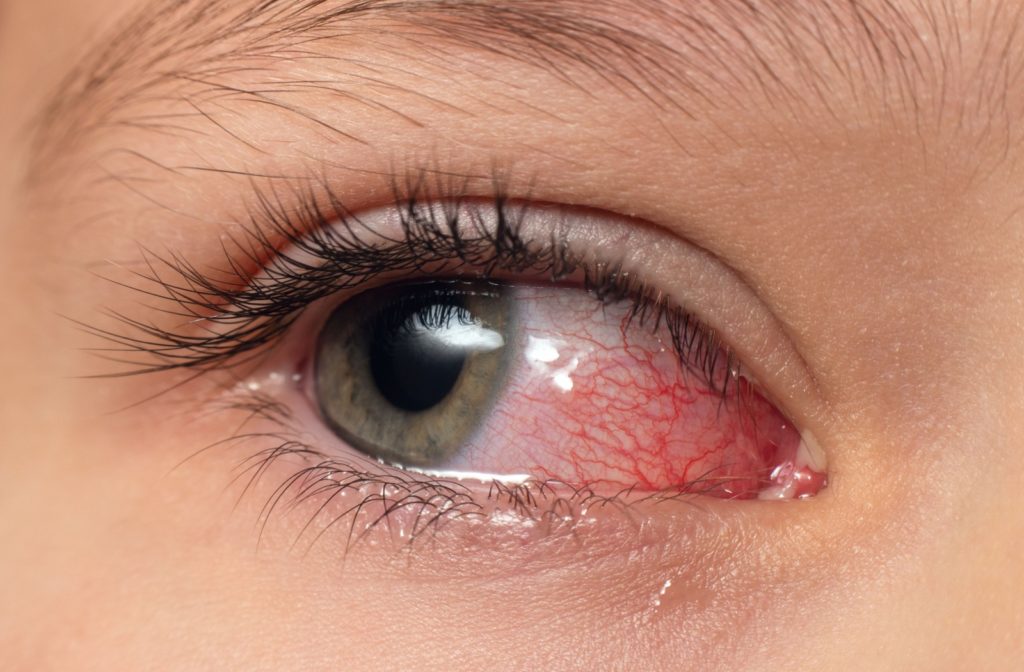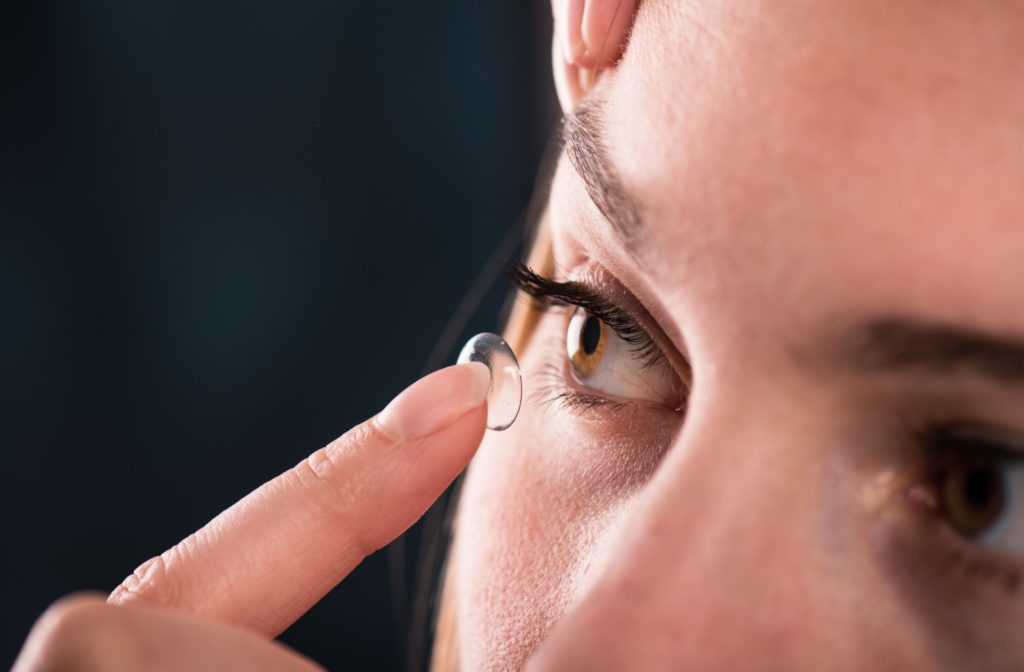Eye infections can be quite uncomfortable, but they can harm your eyes if you don’t address them quickly. If you wear contacts, it’s important to avoid wearing them if your eyes are infected or irritated.
Why? Contacts can worsen infections and potentially cause eye damage. Always follow your eye doctor’s advice on when it’s safe to resume wearing contacts.
Common Causes of Eye Infections
Understanding the different types of eye infections can help you identify potential problems early and seek appropriate treatment. Here’s a breakdown of some common causes of eye infections.
Bacterial Conjunctivitis
Bacterial conjunctivitis, commonly known as pink eye, is a highly contagious infection caused by bacteria. Symptoms include redness, itching, and discharge from the eye. This infection can be easily spread through contact with contaminated hands or objects and typically requires antibiotic treatment.
Recovery time can range from a few days to a week. It’s essential to avoid wearing contact lenses until the infection has completely cleared up to prevent reinfection.
Viral Conjunctivitis
Viral conjunctivitis is another common type of eye infection that can be caused by several different viruses, including the common cold. Symptoms are similar to bacterial conjunctivitis but may also include watery or mucous-like discharge and may last one to two weeks. This infection is highly contagious and can quickly spread through close contact with an infected person.
Treatment typically involves soothing remedies such as cool compresses and over-the-counter eye drops, as antibiotics are not effective against viral infections. Avoid wearing contact lenses during this period, as the infection can easily spread to the other eye.
Allergic Conjunctivitis
Allergic conjunctivitis is caused by allergens such as pollen, dust, or pet dander irritating the eyes. It’s often accompanied by allergic rhinitis (hay fever) and can cause symptoms like redness, itching, and tearing.
Treating allergic conjunctivitis involves avoiding exposure to the allergen and using antihistamine eye drops or oral medication. In severe cases, a doctor may prescribe corticosteroids to reduce inflammation. Avoid wearing contacts during an allergy flare-up, as they can irritate your eyes further.
Fungal Infections
Fungal eye infections are relatively rare but can be severe. They often require prolonged antifungal treatment and can take a long time to heal. It’s crucial to avoid wearing contact lenses until your doctor confirms the infection is entirely resolved.
Why Shouldn’t You Wear Contacts with an Eye Infection?
Optometrists generally recommend discontinuing contact lens wear and waiting until all symptoms of an eye infection have resolved before wearing contact lenses again. This includes symptoms like redness, discharge, or discomfort. Your optometrist may also advise replacing your contact lenses and case to prevent reinfection.
Following up with your optometrist regularly for comprehensive eye exams is also essential. They can assess your eye health and ensure that you are ready to wear contact lenses safely again. Never hesitate to reach out to a professional if you have any concerns or questions about your recovery process because it’s better to err on the side of caution regarding infection.
Factors to Consider Before Resuming Contact Lens Wear
When deciding when to put your contact lenses back in, several important factors should be considered:
- The severity of the infection: Mild infections may allow for a quicker return, while more severe ones may require a longer recovery period.
- Adherence to treatment: Completing your prescribed medication and following your doctor’s advice is crucial for healing.
- Individual healing time: Healing rates vary, so monitor your symptoms closely and consult your healthcare provider before resuming contact lens wear.
By carefully considering these factors, you can help ensure a safe and successful return to wearing contact lenses.

Tips for Preventing Future Eye Infections
By following a few simple tips, you can significantly reduce your risk of developing eye infections.
Maintain Proper Hygiene
Good hygiene is one of the most effective ways to prevent eye infections. Wash your hands thoroughly before handling contact lenses, clean and store your lenses properly, avoid touching your eyes, and don’t share eye products.
Replace Lenses & Cases Regularly
Old lenses and cases can harbor bacteria and other pathogens, so replacing them regularly is important. Follow the replacement schedule provided by your eye care professional and the lens manufacturer to protect your eye health and prevent infections.
Avoid Over-Wearing Your Contacts
Wearing contact lenses for extended periods can increase your risk of infection. Give your eyes a break by switching to glasses when possible, and only sleep in your contact lenses if they are specifically designed for overnight wear.
Talk to Your Eye Doctor
Eye infections can be frustrating for contact lens wearers, but you can recover fully and prevent future problems with proper care and patience. Always consult your eye doctor before resuming contact lens use and follow their guidelines. By doing so, you can maintain healthy eyes and enjoy the benefits of contact lenses without unnecessary risks.
If you’re experiencing any signs of an eye infection, don’t hesitate to contact us. Our experienced team at Total Vision Pleasanton can provide a thorough examination and personalized treatment plan to help you get back to wearing your contact lenses comfortably.



